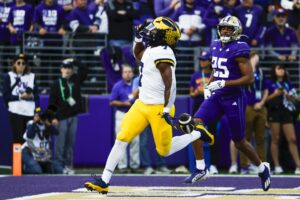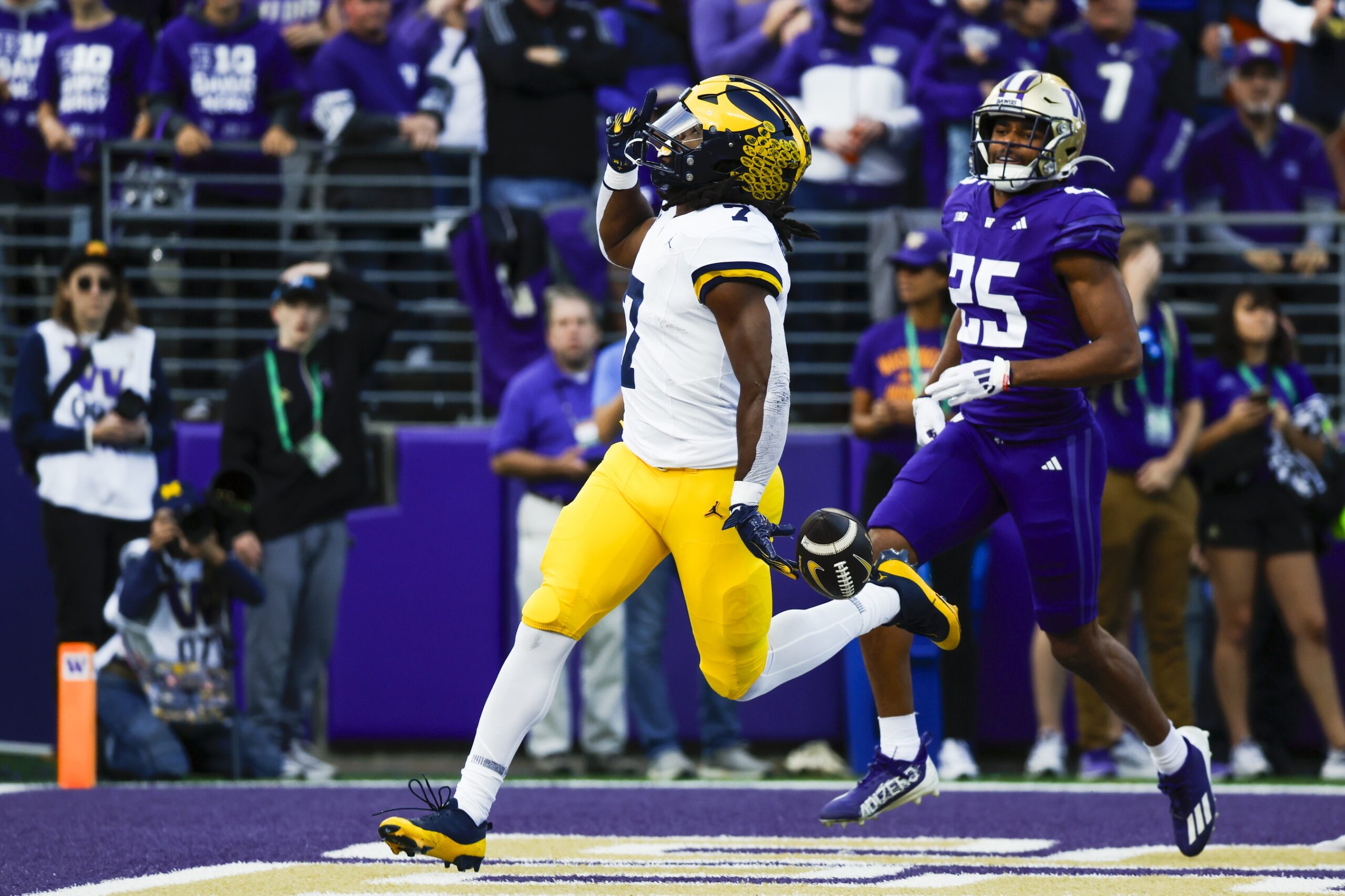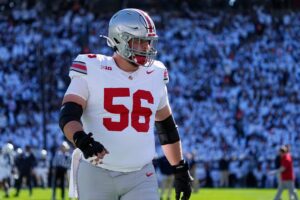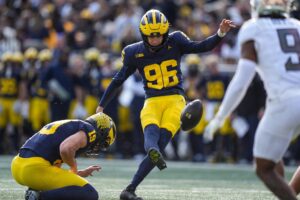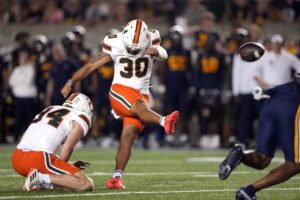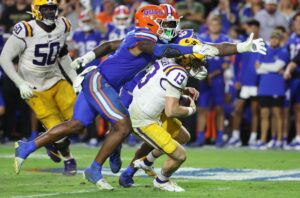For a moment, Michigan football looked like it had found something. An un-turned corner suddenly seemed turnable.
In the second quarter, down 14-0 to the Washington Huskies, the Wolverines had punted thrice and looked lost. Enter program savior and seventh-year senior Jack Tuttle, the two-time transfer fresh off an injury. Tuttle looked poised in the pocket and led the team past midfield before handing Donovan Edwards a one-way ticket to paydirt.
Michigan turned their next two positions into 10 more points. Positive momentum mounted. Then…
- Punt
- Punt
- Fumble
- Interception
- Ugly 1-minute drill. Game over.
21 plays for a combined total of 39 yards. No cohesion, back-breaking turnovers, and ugly football. It’s not a recipe to stay the #10 ranked team in the country, even if that ranking felt fraudulent to even moderately observant fans. Washington avenged their national championship loss, stormed the field, and left Wolverine players, coaches, and fans wondering “What has happened?” And perhaps more importantly, “what happens next?”
With a vital bye week on deck, let’s ponder those questions.
Six Games, Three Quarterbacks, No Answers On Offense
It’s never great when you’ve got a carousel at the most important position on the field. Davis Warren was sporadically capable, but couldn’t shake a nasty ‘throwing multiple interceptions per game’ habit. Alex Orji‘s athleticism now looks best suited for another position (can he catch passes?). Tuttle looks the most competent of the bunch and should provide a stable floor.
Regardless of who quarterbacks Michigan across the finish line, the pieces around them are largely uninspiring at this point. The offensive line’s best contributor (Myles Hinton) is injured. On the other side of the line, Michigan continues to trot out PFF’s worst-graded offensive tackle in Evan Link. The wide receivers continue to get zero separation and have not been sure-handed enough to make their quarterbacks better. The only bright spots are Edwards, Kalel Mullings, Max Bredeson, and Colston Loveland. That triad can only do so much with defenses keying in on them every play.
Plain and simple, this team does not have last year’s talent. J.J. McCarthy, Roman Wilson, and Cornelius Johnson are not walking through that door. You cannot, as it turns out, graduate an entire shark’s jawline of an offensive line and expect a new row of teeth to just appear in its place. Some of this could have been addressed in the portal and on the recruiting trail, but the timing of Jim Harbaugh’s departure after the National Championship muddied the waters there.
Some Important Coaching Context
Hindsight is certainly easier than foresight. Still, pre-season expectations for a seamless transition from Harbaugh to Sherrone Moore now feel very much like rose-colored glasses. Moore’s seven years at Michigan provide valuable continuity, but he’s only one man. Harbaugh took a sizable chunk of his Wolverine staff to Los Angeles, including defensive coordinator Jesse Minter and strength coach Ben Herbert. A brief aside – Herbert’s departure might sneakily be the most important. He was essentially a second head coach whose regimen played a major role in keeping recent teams healthy.
For Moore’s part, minus some internal promotions, he had to go out and recruit a new staff. And while it can be tempting to immediately dole out failing grades after six games, that’d be a knee-jerk response. Yes, it’s been an ugly six games, but it’s only six games. Even Harbaugh took time to truly figure it out at Michigan. He spent six years oscillating between success and failure until he found the winning formula in 2021. Given how the season’s gone thus far, and Michigan’s roster construction, it might be a year or two before Moore finds his footing.
And that has to be ok. The portal can accelerate the process, and Michigan will continue to recruit at a high level as one of the sport’s premier programs. But for a first-time head coach, this was always going to be a learning year. Some of the lessons will be about in-game personnel, and how to gameplan around it – what to do with a running quarterback, for instance. Other lessons will be about which staffers are doing their jobs well, which are not, and when to pivot accordingly. He’s earned a chance to make those calls, deal with the results, and take the necessary time to write his own chapter.
That Said…The Coaching Could Be Better
The top end of this defense remains elite. Josaiah Stewart, Mason Graham, Kenneth Grant, and Derrick Moore all look bound for Sunday football. Despite a rough game against Washington, Will Johnson will join them. There’s talent and emerging depth – hello, TJ Guy – at all three levels. The problem, bluntly, is that fairly often they seem unprepared to play football.
Players look panicked from time to time as they line up pre-snap. They’re missing tackles at an alarming rate. Even previously known commodities like Makari Paige are finding themselves lost in coverage. Some of that has to be fatigue – there have been more injuries this year, with less depth, which means fewer breaks for top-end talent as a result. But much of it has to come back to coaching. Players need to execute, yes, but too often this year it appears as though they’re not being set up for success.
For instance: Wink Martindale was called out in the first few games for being too blitz-happy. To his credit, he’s since dialed it back. The problem lies more in when he calls his blitzes, particularly zero-blitzes. At least twice they were called against Washington, and at least twice they were exploited. The first went for an easy first-down conversion early in the fourth quarter. On the second, Will Johnson committed one of the more obvious pass interferences you’ll ever see, which led Washington to the game’s final, fatal points.
It’s an arduous journey toward winning football when the defense is predictably busting coverages multiple times per game.
Revised Expectations
The remaining schedule goes to Illinois, Michigan State, Oregon, Indiana, Northwestern, and Ohio State. Before the season that looked like four wins and two toss-ups. It now looks like an uphill battle to 7-5.
Illinois and Indiana have been surprisingly resurgent this year. Indiana in particular has shown up with a dangerous offense under Curt Cignetti, who has the Hoosiers hurtling towards the dream that was promised: #9WINDIANA. Michigan State is in year zero under Jonathan Smith, but if they ever cobble together a run game for Aidan Chiles, they’ve got a shot to arrive ahead of schedule. Plus, Sparty’s always got something cooking for the biggest game of their season.
Northwestern-By-The-Sea looks like the only game close to a ‘sure thing’ remaining. Even then, it’s tough to call anything a ‘sure thing’ at this point. Except maybe that Michigan is likely going to run into a wall, Wile E. Coyote-style, against Oregon and Ohio State.
Moore and his team will now happily welcome the bye week to lick their wounds, try to get healthy, and see if they can clean up last week’s numerous mistakes. Bret Bielema’s sturdy Illinois squad awaits them on the other side. In the meantime, the fanbase might similarly take a breath and remember: that these things take time.
